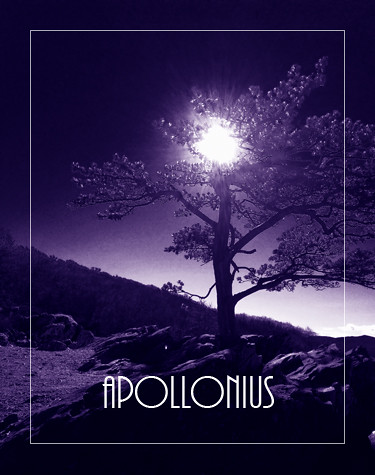
Volume XVI, Issue I
Apollonius
By Bob Kirchman
Copyright © 2019, The Kirchman Studio, all rights reserved
Introduction: A Bit More Reckless Engineering
The establishment of the Alaska Republic in the mid-Twenty-first Century opened up a time of new growth and prosperity for mankind. Tundra farms, biospheres and determination tamed the world's Northernmost frontiers and created homes for millions. Rupert Zimmerman had been one of the initial visionaries but his daughter Elizabeth, his son-in-law Martin and his granddaughter would go even further. The Summer sun never set on the gleaming tower taking shape on Cape Lisbon and crews were working round the clock to complete the gigantic linear accelerator launch complex... a bridge, as it were, to other worlds. On drawing screenpads in Wales, the schematics for the Great Northern, a space ship of epic proportions were being developed. Since the days of Jules Verne, people dreamed of traveling into space and exploring her riches. The American space program set men on the moon in 1969 but there was no economic reason to go further. Great Northern would be built slowly, and the completed ship would be able to make the nine month long journey to the orbit of Mars. There the technology developed to tame the Earth's North; greenhouses and biospheres, would be tested as a means of beginning to terraform the red planet. There were always those thinkers who felt that mankind needed to extend their presence to other worlds to assure survival. Though Zimmerman felt the survival of mankind was in the hands of Someone much higher, he welcomed the investment of such people in the space program.
Indeed; Rupert saw it more as the same need he had first identified in his seven month old granddaughter... the need to go further. The need to move forward! He noticed that the girl was fussy as an infant, but as she learned to push herself up, to roll, and eventually scoot along the floor, she became quite content in her quest for adventure! Humankind seemed created with an almost insatiable need to reach out and that was reason enough for Rupert Zimmerman.
(to be continued)
Chapter 1: The Challenge of Moon and Mars
The first man in space, Yuri Gagarin, was reported to have said: “I went up into space, but I didn’t encounter God.” That story was often repeated by the Atheistic Soviet Regime that sent him there and by the Western powers as they refuted the claims of the Soviet regime. His friend, General Valentin Petrov, a professor at the Russian Air Force Academy had a different story. He said of his personal friend the Cosmonaut: “He always confessed God whenever he was provoked, no matter where he was.” Gagarin was a baptized member of the Orthodox Church. Petrov remembered Gagarin saying something quite different in fact: “An astronaut cannot be suspended in space and not have God in his mind and his heart.” It was actually Nikita Khrushchev who had mockingly said: “Why don’t you step on the brakes in front of God?” In the Cold War days the U.S. President, John F. Kennedy, deftly created the civilian space agency, NASA. The struggle to control the high ground of space became recast as a race to the moon and it captured the imaginations of millions. When Gagarin orbited the Earth, the Atheist Empire was dominating. The Russians were depending on immense boosters to go beyond low Earth orbit and when they created the larger multi-engined rocket they needed they couldn’t make it work dependably. Jim Lovell commanded Apollo 8 on a mission to orbit the moon on Christmas Eve in 1968. He read from the Biblical story of Creation. “And God saw that it was good!” The Russians had been lapped.
Apollo 11 landed on the moon and Neil Armstrong and Buzz Aldrin were the first men to set foot on another body in space!, fulfilling Jules Verne’s vision in “From the Earth to the Moon.” They actually celebrated the Lord’s Supper there in the lunar lander before they set foot on the lunar surface! It was an amazing time to be alive. Technological advances created as part of the space program enriched and saved lives as space technology found its way into other areas such as medicine. But the moon itself held no great riches. Men had come, but after Apollo 17 they never returned. Futurists often wrote about colonizing the moon or Mars as a way to ensure mankind survived. NASA, having inspired millions and having brought together incredible talents in the sciences, became another federal bureaucracy and even gave up the capacity to launch men into space. They had to buy rides to the International Space Station from their old competitors, the Russians! After the new world of the North opened up in the wake of the Bering Strait Bridge, mankind again looked to the stars. As money and goods flowed through the new world that had been opened up, there Billionaire George Apollonius was alarmed. His plans for one-world government had been thwarted by the free men and women of the North Country and in his alarm he began to lobby for the nations of the world to terraform Mars, that is make it fit for human habitation. He would have his one-world government… even if it meant building a new world!
But he lacked much of the funding necessary to do it and the engineering ability as well. NASA was but a shell of its former glory and the great advances were being made by Alaska Republic and Israel’s joint space launch complex at Cape Lisbon. Here Apollonius would seek an unholy alliance that would build a ship to take him to Mars. The Zimmerman Organization, for its part, was responding to a concern raised by the leadership of the Alaska Autonimous Republic. They wanted a platform for an enhanced version of Israel’s Iron Dome to protect themselves from rogue nations lobbing nuclear warheads. Space Station/Assembly Center 005 was the platform from which incoming missiles could be detected and destroyed. Its components were initially ferried into orbit by U.S. and Russian Boosters, but of late, the supplying of the station was being accomplished by shuttles launched from Cape Lisbon’s newly completed linear accelerator. Apollonius and Zimmerman had an odd connection, through which began their odd partnership… both were members of London’s Reform Club. Both men traveled quite a bit and were drawn to the club by its association with Jules Verne’s fictional Phileas Fogg, who enters into his famous wager there over a game of whist! Both had been recommended for membership by associates who were in the club and both enjoyed the congenial atmosphere and the fine cuisine.
How goes your work at Cape Lisbon?” Apollonius asked Rupert Zimmerman at dinner one night.
We’ve just begun linear induction launches of small shuttles to our space station.” the old man replied. “Research teams will then ascend to Space Station/Assembly Center 005. We plan to send an unmanned probe to Mars straightway. It will be far more sophisticated than Curiosity.”
Men?, will you then send human explorers?”
No, cost is way out of line with the benefits.”
I needn’t remind you, Mr. Zimmerman, that your precious free world will one day conspire to blow itself up! Where will mankind go when that happens?”
Oh, Mr. Apollonius, I don’t presume so as to think that man can thwart the designs of a loving God toward His Creation!”
Come now!, you are a world leader, even as you avoid title and publicity. You know damn well that God is just a fable for the weak. All that you see is all that there is. What would it take to convince you to team up with me to build a manned mission to Mars?”
I would have to see some benefit that made it worth the risk of human life.”
The survival of mankind is not worth the risk!” Exclaimed Apollonius.
But would you acknowledge, dear Apollonius, that there is more to this universe than you or I can see?” Here Zimmerman secretly wished his friend Jonathan Greene present, but the old man was here quite without his mentor in things unseen. It was Greene who had helped open Zimmerman’s eyes to the Truth he now sought to defend. But Greene was on the other side of the Globe, so to speak. He was in the biosphere town on Big Diomede in the Bering Strait. He was making animal pancakes for his daughter’s breakfast as it was the morning of a school day.
If they are unseen, they can be detected in other ways.” Apollonius responded.
Very well then, if you are an honest inquirer, I challenge you! And I invite you to come to Cape Lisbon and see for Yourself!”
The sun had set in London, but it was rising on Big Diomede on a brand new day. To Zimmerman’s surprise, George Apollonius accepted the offer to travel halfway around the world. “…on one condition. If I can convince you that the journey is worth the risk, you will help me organize a manned mission to Mars!”
(to be continued)
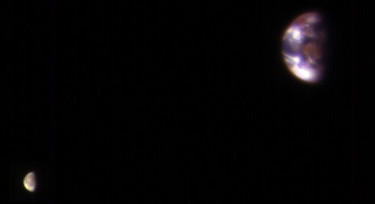
This composite image of Earth and its moon, as seen from Mars, combines the best Earth image with the best moon image from four sets of images acquired on Nov. 20, 2016, by the High Resolution Imaging Science Experiment (HiRISE) camera on NASA's Mars Reconnaissance Orbiter. NASA Photo
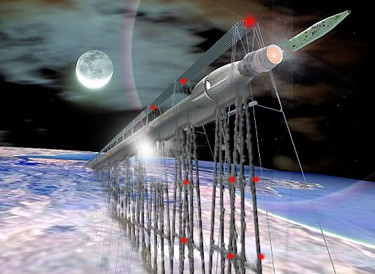
The Linear Induction Launch System at Cape Lisbon. [1.]
Terraforming Mars
National Geographic
For some time there has been a fascination with the idea of colonizing Mars.
In 1952, Wernher von Braun wrote a book called "Project Mars" [1.] which imagined that human colonists on Mars would be led by a person called "Elon." Starting with A Princess of Mars [2.] in 1917, Edgar Rice Burroughs wrote eleven novels that portrayed an arid world he called Barsoom made habitable by an “atmosphere factory” (these books were the basis for the recent Disney movie John Carter). The stories in Ray Bradbury’s 1950 collection The Martian Chronicles [3.] were set on a desert planet crisscrossed with canals built by an alien civilization to distribute water from the polar caps. Arthur C. Clarke’s 1952 novel The Sands of Mars [4.] also presents a transformation of the Red Planet to support human life. Kim Stanley Robinson’s Red Mars/Green Mars/Blue Mars trilogy was published in the period of 1992-1996. [5.]

Chasma Boreale, a long, flat-floored valley, cuts deep into Mars' north polar icecap. Its walls rise about 4,600 feet, or 1,400 meters, above the floor. Where the edge of the ice cap has retreated, sheets of sand are emerging that accumulated during earlier ice-free climatic cycles. Winds blowing off the ice have pushed loose sand into dunes and driven them down-canyon in a westward direction. NASA Image

The Orb of Mars. NASA Photo

This is a screen shot from a high-definition simulated movie of Mojave Crater on Mars, based on images taken by the High Resolution Imaging Science Experiment (HiRISE) camera on NASA's Mars Reconnaissance Orbiter. A 3-D surface model was created using stereo pairs from the HiRISE camera. Mojave Crater has a diameter of 60 kilometers (37 miles). NASA Image
My Cathedral in Four Seasons
Photos by Bob Kirchman
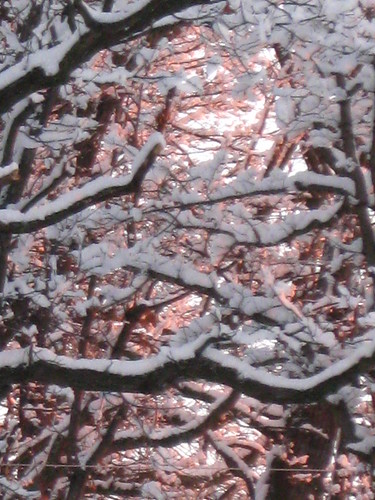
Winter

Spring
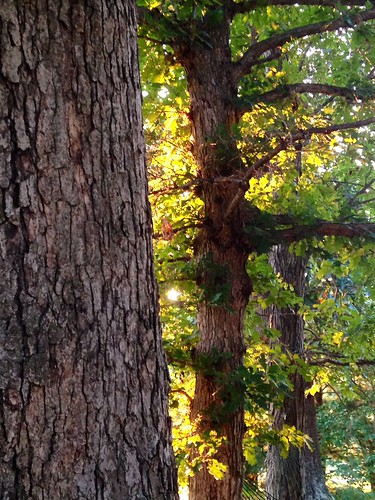
Summer
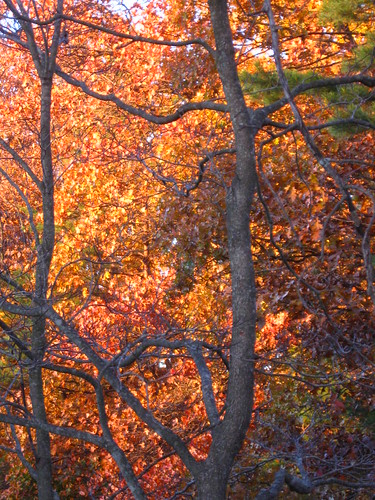
Fall
O sing unto the Lord a new song: sing unto the Lord, all the earth.
Sing unto the Lord, bless his name; shew forth his salvation from day to day.
Declare his glory among the heathen, his wonders among all people.
For the Lord is great, and greatly to be praised: he is to be feared above all gods.
For all the gods of the nations are idols: but the Lord made the heavens.
Honour and majesty are before him: strength and beauty are in his sanctuary.
Give unto the Lord, O ye kindreds of the people, give unto the Lord glory and strength.
Give unto the Lord the glory due unto his name: bring an offering, and come into his courts.
O worship the Lord in the beauty of holiness: fear before him, all the earth.
Say among the heathen that the Lord reigneth: the world also shall be established that it shall not be moved: he shall judge the people righteously.
Let the heavens rejoice, and let the earth be glad; let the sea roar, and the fulness thereof.
Let the field be joyful, and all that is therein: then shall all the trees of the wood rejoice
Before the Lord: for he cometh, for he cometh to judge the earth: he shall judge the world with righteousness, and the people with his truth.” -- Psalm 96
Beauty and Desecration
By Roger Scruton
[Click to Read]
At any time between 1750 and 1930, if you had asked an educated person to describe the goal of poetry, art, or music, “beauty” would have been the answer. And if you had asked what the point of that was, you would have learned that beauty is a value, as important in its way as truth and goodness, and indeed hardly distinguishable from them. Philosophers of the Enlightenment saw beauty as a way in which lasting moral and spiritual values acquire sensuous form. And no Romantic painter, musician, or writer would have denied that beauty was the final purpose of his art. (read more)
Paradigm Shift
Should Christ’s Followers be Futurists?
By Bob Kirchman
Roger Scruton points to a time when the transcendent informed the direction of the present. The disciplines of Art, Music and Design in particular sought to lift our existence. Cathedrals aspired to Heaven in their very design, warping stone into a visual depiction of the intersection of nature and Supernatural. Modern thought has usurped all of that.
The Faithful, for their part, seem to have surrendered.
A George Barna poll suggests that only a single digit percentage of those who profess to be believers actually have a Biblical worldview. Read between the lines and that statistic suggests that something else informs them. Another statistic says that most people get their news from the big three networks in spite of the recent profusion of alternative sources which question the narrative being put forth both by the academy and popular media. I want to look specifically at the church, and how it has possibly abdicated its role as a shaper of the human experience.
Without being overly critical, and mainly as a point of discussion, I would like to look at the modern interaction of church and culture. First of all, the secular society has in so many ways told the Faithful that while they are free to worship, they are not welcome in the public square. The church, for its part, has too quickly and quietly left the shaping of culture to the Barbarians, so to speak. In order to be ‘relevant’ we take on the music and trappings of the society around us more often than we offer alternative. Our architecture, once rich with transcendent imagery, has become increasingly metal buildings with a theater inside. We have to find older structures to be inspired by stained glass and pipe organs.
We rationalize this on the basis of stewardship (metal buildings are cheaper) and evangelism (most people today don’t listen to Handel and movies/music are the language and literature of the young). The reaching out into our culture is not a bad thing at all and we should not be extravagant in our building programs, but I would suggest that our modern paradigm has left us with a noticeable poverty in illuminating the pathway to things Divine.
Some of our brothers are too quick to jump into eschatology and too slow to practice practical economic development. We sometimes seem too preoccupied with apocalyptic visions and ‘getting out of here.’ As Christ’s ambassadors, we cease to man the embassy. The sad thing is that only reinforces the view of many around us that we are irrelevant. We want to be raptured; they can't wait for us to go!
If in centuries past, the call of Transcendent Truth shaped how we built things as well as how we thought about them, can we not find value in that today? If I should drop dead this moment, will not my unrealized visions still have inspired someone to ‘look up?’ I sincerely hope so. To that end, should we not seek to fulfill our calling on this Earth well, knowing that the call to ‘come higher’ is not an end but a beginning? That calling might indeed drive us to envision great things… not from hubris but rather from a sense that we serve a great Master. We are here creating our sample work. One day we shall stand in His studio. Will he indeed say: “Well done, good and faithful servant!” Then might He not continue: “Come see what I am working on!”
While I am obviously not advocating an over-zealous Asceticism that creates a very utilitarian culture aimed at simply doing our job here, surviving this horrible world and getting out; neither is it a call to the opulence that has characterized some television ministries. It is possible to offer our best, within our means, and create things that are in themselves an expression of worship. I think of the many country churches with their fine craftsmanship and simple lines. Can we find that elegance again? I believe we can. I believe we can create works in keeping with our profession of the richness of the Divine. I believe we will do the world a great service by doing so.
Yes, we should dream dreams and inspire our young people to do so as well. We should help revitalize communities on other continents. We should offer beauty and purpose to our own. Young people need to stand in our churches and sing beautiful solos that move us to tears. We should remember the lessons of times past, where the hope of Heaven fueled our passion to make our world a better place as a testimony to that hope. We, of all people, should indeed be ‘Futurists.’
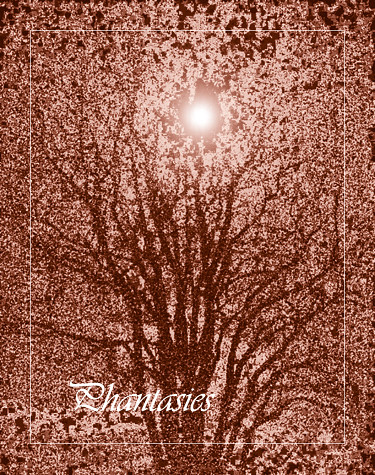
Volume XVI, Issue Ia
Phantasies
By George MacDonald, Chapter 10
From Eden's bowers the full-fed rivers flow,
To guide the outcasts to the land of woe:
Our Earth one little toiling streamlet yields.
To guide the wanderers to the happy fields."
After leaving this village, where I had rested for nearly a week, I travelled through a desert region of dry sand and glittering rocks, peopled principally by goblin-fairies. When I first entered their domains, and, indeed, whenever I fell in with another tribe of them, they began mocking me with offered handfuls of gold and jewels, making hideous grimaces at me, and performing the most antic homage, as if they thought I expected reverence, and meant to humour me like a maniac. But ever, as soon as one cast his eyes on the shadow behind me, he made a wry face, partly of pity, partly of contempt, and looked ashamed, as if he had been caught doing something inhuman; then, throwing down his handful of gold, and ceasing all his grimaces, he stood aside to let me pass in peace, and made signs to his companions to do the like. I had no inclination to observe them much, for the shadow was in my heart as well as at my heels. I walked listlessly and almost hopelessly along, till I arrived one day at a small spring; which, bursting cool from the heart of a sun-heated rock, flowed somewhat southwards from the direction I had been taking. I drank of this spring, and found myself wonderfully refreshed. A kind of love to the cheerful little stream arose in my heart. It was born in a desert; but it seemed to say to itself, "I will flow, and sing, and lave my banks, till I make my desert a paradise." I thought I could not do better than follow it, and see what it made of it. So down with the stream I went, over rocky lands, burning with sunbeams. But the rivulet flowed not far, before a few blades of grass appeared on its banks, and then, here and there, a stunted bush. Sometimes it disappeared altogether under ground; and after I had wandered some distance, as near as I could guess, in the direction it seemed to take, I would suddenly hear it again, singing, sometimes far away to my right or left, amongst new rocks, over which it made new cataracts of watery melodies. The verdure on its banks increased as it flowed; other streams joined it; and at last, after many days' travel, I found myself, one gorgeous summer evening, resting by the side of a broad river, with a glorious horse-chestnut tree towering above me, and dropping its blossoms, milk-white and rosy-red, all about me. As I sat, a gush of joy sprang forth in my heart, and over flowed at my eyes.
Through my tears, the whole landscape glimmered in such bewildering loveliness, that I felt as if I were entering Fairy Land for the first time, and some loving hand were waiting to cool my head, and a loving word to warm my heart. Roses, wild roses, everywhere! So plentiful were they, they not only perfumed the air, they seemed to dye it a faint rose-hue. The colour floated abroad with the scent, and clomb, and spread, until the whole west blushed and glowed with the gathered incense of roses. And my heart fainted with longing in my bosom.
Could I but see the Spirit of the Earth, as I saw once the in dwelling woman of the beech-tree, and my beauty of the pale marble, I should be content. Content!--Oh, how gladly would I die of the light of her eyes! Yea, I would cease to be, if that would bring me one word of love from the one mouth. The twilight sank around, and infolded me with sleep. I slept as I had not slept for months. I did not awake till late in the morning; when, refreshed in body and mind, I rose as from the death that wipes out the sadness of life, and then dies itself in the new morrow. Again I followed the stream; now climbing a steep rocky bank that hemmed it in; now wading through long grasses and wild flowers in its path; now through meadows; and anon through woods that crowded down to the very lip of the water.
At length, in a nook of the river, gloomy with the weight of overhanging foliage, and still and deep as a soul in which the torrent eddies of pain have hollowed a great gulf, and then, subsiding in violence, have left it full of a motionless, fathomless sorrow--I saw a little boat lying. So still was the water here, that the boat needed no fastening. It lay as if some one had just stepped ashore, and would in a moment return. But as there were no signs of presence, and no track through the thick bushes; and, moreover, as I was in Fairy Land where one does very much as he pleases, I forced my way to the brink, stepped into the boat, pushed it, with the help of the tree-branches, out into the stream, lay down in the bottom, and let my boat and me float whither the stream would carry us. I seemed to lose myself in the great flow of sky above me unbroken in its infinitude, except when now and then, coming nearer the shore at a bend in the river, a tree would sweep its mighty head silently above mine, and glide away back into the past, never more to fling its shadow over me. I fell asleep in this cradle, in which mother Nature was rocking her weary child; and while I slept, the sun slept not, but went round his arched way. When I awoke, he slept in the waters, and I went on my silent path beneath a round silvery moon. And a pale moon looked up from the floor of the great blue cave that lay in the abysmal silence beneath.
Why are all reflections lovelier than what we call the reality?--not so grand or so strong, it may be, but always lovelier? Fair as is the gliding sloop on the shining sea, the wavering, trembling, unresting sail below is fairer still. Yea, the reflecting ocean itself, reflected in the mirror, has a wondrousness about its waters that somewhat vanishes when I turn towards itself. All mirrors are magic mirrors. The commonest room is a room in a poem when I turn to the glass. (And this reminds me, while I write, of a strange story which I read in the fairy palace, and of which I will try to make a feeble memorial in its place.) In whatever way it may be accounted for, of one thing we may be sure, that this feeling is no cheat; for there is no cheating in nature and the simple unsought feelings of the soul. There must be a truth involved in it, though we may but in part lay hold of the meaning. Even the memories of past pain are beautiful; and past delights, though beheld only through clefts in the grey clouds of sorrow, are lovely as Fairy Land. But how have I wandered into the deeper fairyland of the soul, while as yet I only float towards the fairy palace of Fairy Land! The moon, which is the lovelier memory or reflex of the down-gone sun, the joyous day seen in the faint mirror of the brooding night, had rapt me away.
I sat up in the boat. Gigantic forest trees were about me; through which, like a silver snake, twisted and twined the great river. The little waves, when I moved in the boat, heaved and fell with a plash as of molten silver, breaking the image of the moon into a thousand morsels, fusing again into one, as the ripples of laughter die into the still face of joy. The sleeping woods, in undefined massiveness; the water that flowed in its sleep; and, above all, the enchantress moon, which had cast them all, with her pale eye, into the charmed slumber, sank into my soul, and I felt as if I had died in a dream, and should never more awake.
From this I was partly aroused by a glimmering of white, that, through the trees on the left, vaguely crossed my vision, as I gazed upwards. But the trees again hid the object; and at the moment, some strange melodious bird took up its song, and sang, not an ordinary bird-song, with constant repetitions of the same melody, but what sounded like a continuous strain, in which one thought was expressed, deepening in intensity as evolved in progress. It sounded like a welcome already overshadowed with the coming farewell. As in all sweetest music, a tinge of sadness was in every note. Nor do we know how much of the pleasures even of life we owe to the intermingled sorrows. Joy cannot unfold the deepest truths, although deepest truth must be deepest joy. Cometh white-robed Sorrow, stooping and wan, and flingeth wide the doors she may not enter. Almost we linger with Sorrow for very love.
As the song concluded the stream bore my little boat with a gentle sweep round a bend of the river; and lo! on a broad lawn, which rose from the water's edge with a long green slope to a clear elevation from which the trees receded on all sides, stood a stately palace glimmering ghostly in the moonshine: it seemed to be built throughout of the whitest marble. There was no reflection of moonlight from windows--there seemed to be none; so there was no cold glitter; only, as I said, a ghostly shimmer. Numberless shadows tempered the shine, from column and balcony and tower. For everywhere galleries ran along the face of the buildings; wings were extended in many directions; and numberless openings, through which the moonbeams vanished into the interior, and which served both for doors and windows, had their separate balconies in front, communicating with a common gallery that rose on its own pillars. Of course, I did not discover all this from the river, and in the moonlight. But, though I was there for many days, I did not succeed in mastering the inner topography of the building, so extensive and complicated was it.
Here I wished to land, but the boat had no oars on board. However, I found that a plank, serving for a seat, was unfastened, and with that I brought the boat to the bank and scrambled on shore. Deep soft turf sank beneath my feet, as I went up the ascent towards the palace.
When I reached it, I saw that it stood on a great platform of marble, with an ascent, by broad stairs of the same, all round it. Arrived on the platform, I found there was an extensive outlook over the forest, which, however, was rather veiled than revealed by the moonlight.
Entering by a wide gateway, but without gates, into an inner court, surrounded on all sides by great marble pillars supporting galleries above, I saw a large fountain of porphyry in the middle, throwing up a lofty column of water, which fell, with a noise as of the fusion of all sweet sounds, into a basin beneath; overflowing which, it ran into a single channel towards the interior of the building. Although the moon was by this time so low in the west, that not a ray of her light fell into the court, over the height of the surrounding buildings; yet was the court lighted by a second reflex from the sun of other lands. For the top of the column of water, just as it spread to fall, caught the moonbeams, and like a great pale lamp, hung high in the night air, threw a dim memory of light (as it were) over the court below. This court was paved in diamonds of white and red marble. According to my custom since I entered Fairy Land, of taking for a guide whatever I first found moving in any direction, I followed the stream from the basin of the fountain. It led me to a great open door, beneath the ascending steps of which it ran through a low arch and disappeared. Entering here, I found myself in a great hall, surrounded with white pillars, and paved with black and white. This I could see by the moonlight, which, from the other side, streamed through open windows into the hall.
Its height I could not distinctly see. As soon as I entered, I had the feeling so common to me in the woods, that there were others there besides myself, though I could see no one, and heard no sound to indicate a presence. Since my visit to the Church of Darkness, my power of seeing the fairies of the higher orders had gradually diminished, until it had almost ceased. But I could frequently believe in their presence while unable to see them. Still, although I had company, and doubtless of a safe kind, it seemed rather dreary to spend the night in an empty marble hall, however beautiful, especially as the moon was near the going down, and it would soon be dark. So I began at the place where I entered, and walked round the hall, looking for some door or passage that might lead me to a more hospitable chamber. As I walked, I was deliciously haunted with the feeling that behind some one of the seemingly innumerable pillars, one who loved me was waiting for me. Then I thought she was following me from pillar to pillar as I went along; but no arms came out of the faint moonlight, and no sigh assured me of her presence.
At length I came to an open corridor, into which I turned; notwithstanding that, in doing so, I left the light behind. Along this I walked with outstretched hands, groping my way, till, arriving at another corridor, which seemed to strike off at right angles to that in which I was, I saw at the end a faintly glimmering light, too pale even for moonshine, resembling rather a stray phosphorescence. However, where everything was white, a little light went a great way. So I walked on to the end, and a long corridor it was. When I came up to the light, I found that it proceeded from what looked like silver letters upon a door of ebony; and, to my surprise even in the home of wonder itself, the letters formed the words, The Chamber of Sir Anodos. Although I had as yet no right to the honours of a knight, I ventured to conclude that the chamber was indeed intended for me; and, opening the door without hesitation, I entered. Any doubt as to whether I was right in so doing, was soon dispelled. What to my dark eyes seemed a blaze of light, burst upon me. A fire of large pieces of some sweet-scented wood, supported by dogs of silver, was burning on the hearth, and a bright lamp stood on a table, in the midst of a plentiful meal, apparently awaiting my arrival. But what surprised me more than all, was, that the room was in every respect a copy of my own room, the room whence the little stream from my basin had led me into Fairy Land. There was the very carpet of grass and moss and daisies, which I had myself designed; the curtains of pale blue silk, that fell like a cataract over the windows; the old-fashioned bed, with the chintz furniture, on which I had slept from boyhood. "Now I shall sleep," I said to myself. "My shadow dares not come here."
I sat down to the table, and began to help myself to the good things before me with confidence. And now I found, as in many instances before, how true the fairy tales are; for I was waited on, all the time of my meal, by invisible hands. I had scarcely to do more than look towards anything I wanted, when it was brought me, just as if it had come to me of itself. My glass was kept filled with the wine I had chosen, until I looked towards another bottle or decanter; when a fresh glass was substituted, and the other wine supplied. When I had eaten and drank more heartily and joyfully than ever since I entered Fairy Land, the whole was removed by several attendants, of whom some were male and some female, as I thought I could distinguish from the way the dishes were lifted from the table, and the motion with which they were carried out of the room. As soon as they were all taken away, I heard a sound as of the shutting of a door, and knew that I was left alone. I sat long by the fire, meditating, and wondering how it would all end; and when at length, wearied with thinking, I betook myself to my own bed, it was half with a hope that, when I awoke in the morning, I should awake not only in my own room, but in my own castle also; and that I should walk, out upon my own native soil, and find that Fairy Land was, after all, only a vision of the night. The sound of the falling waters of the fountain floated me into oblivion.
(to be continued)
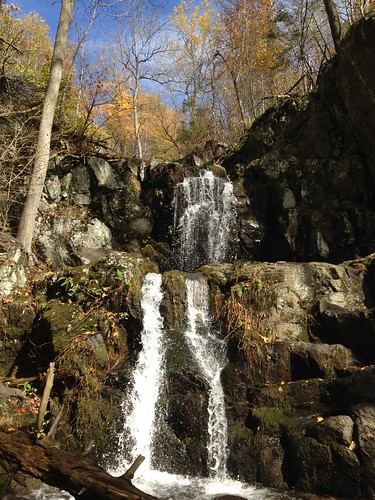
Doyle River Falls. Photo by Bob Kirchman.
Isambard Kingdom Brunel
England's Legendary Bridge Builder

Volume IX, Issue XIV
The Ministry of Building Things
I'll bet if I asked you to think of some different types of ministry and ways to build the Kingdom of G-d, you probably wouldn't think of Economic Development. Pastor Tim Keller, in his book: Resources for Deacons, sees it clearly as a part of the Diaconal ministry. Our church helps women in Zambia get sewing machines. To be sure, the gift of the ability to earn their living as seamstresses is an act of ministry to these ladies.
But think bigger! THYME presents the story of how a nation turned from a great evil and one city suffered greatly in doing so. G-d provided a provider! Then G-d provided provision for the provider by inspiring great innovation that came to revitalize that great city. Should we dare to pray for such innovation and inspiration in our own day?
Isambard Kingdom Brunel
What a Nineteenth Century Innovator Can Teach Us Now
© 2013 The Kirchman Studio, All rights reserved.
They say that the condition for a miracle is difficulty, but the condition for a great miracle is impossibility” -- Angus Buchan, “G-d's Farmer”
When William Wilberforce [1.] had ended the slave trade in the British Empire, he had thrown the city of Bristol, England into economic depression. The port there was heavily devoted to that wretched business and suffered heavily when it was brought to a sudden halt. The unintended consequence had been a rise in children condemned to a life of poverty. Ending the vile business of enslaving Africa's children had resulting in England's society spurning the needs of her own. Into this world came George Müller [2.], who, relying on faith in G-d alone, provided redemption for thousands of orphans. Many of these children were cast-offs of a society in economic despair.
George Müller [3.] had seen the wretched street urchins most people despised as jewels to be polished. Muller, relying solely on Divine provision, built five large houses for Orphans at Ashley Downs in Bristol, England. He trained the girls to be nurses, teachers, clerical workers and domestics. He apprenticed all the boys in various trades. He was excoriated for training these unwanted children "above their station." He ignored the critics.
Müller looked to G-d alone, but Bristol needed an outfowing of Divine provision to provide for her children. G-d's provision for Bristol was to come in the form of inspiration and innovation, embodied in the work of a young pioneer of civil engineering. He also ignored his critics.
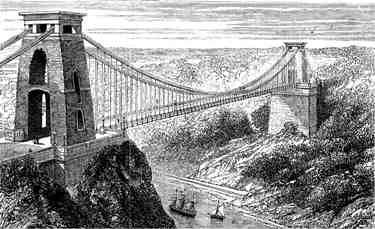
Brunel's Clifton Suspension Bridge became the symbol of the City of Bristol.
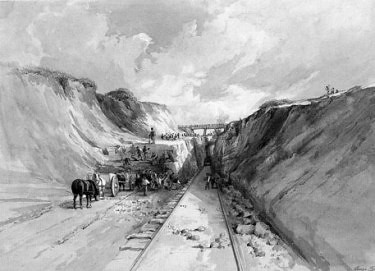
Building the Great Western Railway.
In 1831, 24 year old Isambard Kingdom Brunel [4.] was awarded a contract to bridge the Avon Gorge. It was the dream of a prosperous wine merchant who provided the initial funding. The completed bridge would become the symbol of the city, but lack of funding dogged the project. It took thirty years to complete it. For years only the towers stood completed. In 1833 Brunel began work on the Great Western Railway, which would become the instrument of Bristol's economic revitalization. The nicknames: "Great Way Round" and "G-d's Wonderful Railway" seem to describe well Brunel's great work.
Brunel was an innovator. He probably experienced as many failures as successes in his short lifetime. Born on April 9, 1806, the son of Sir Marc Brunel, he assisted his father in building a tunnel under the Thames. He would later become the resident engineer of that project. At twenty years of age, he designed a suspension bridge to cross the Avon river. A modified version of his plan was actually constructed.
At 26, Brunel was building the Great Western Railway, commissioned to maintain Bristol's importance as a port and position her for trade with America. This wide-gauge railroad linked Bristol and Western regions of England to London. Bristol's prosperity as a port was assured and the work of Müller created solid citizens with strong spiritual foundations to benefit.
But Brunel was not content to simply build a better railway. He looked across the Atlantic, envisioning fleets of ocean greyhounds -- great steamships that would complete the linking of his Great Western Railway to America! The S. S. Great Britain was his creation. It was the first metal-hulled propeller-driven ocean ship and became the prototype for modern ocean liners.
Building the South Devon Railway as a spur to the Great Western, Brunel experimented with an alternative to steam engines -- Vacuum tube powered trains. Stationary vacuum plants evacuated tubes laid along the center of the track that powered the movement of trains.

Brunel's 'Atmospheric Railway.'
The technology required the use of leather flaps to seal the vacuum pipes. The natural oils were drawn out of the leather by the vacuum, making the leather vulnerable to water, rotting it and breaking the fibres when it froze. It had to be kept supple with tallow, which is attractive to rats. The flaps were eaten, and vacuum operation lasted less than a year, from 1847 (experimental service began in September; operations from February 1848) to 10 September 1848.[45] It has been suggested that the whole project was an expensive flop. In Brunel's favour, it has been noted that he had the courage to call a halt to the venture instead of struggling on with it at greater cost." -- Wikipedia
Like alternative transportation prototypes of our day, the vacuum tube system was more expensive. The accounts of the SDR for 1848 show that atmospheric traction cost 3s 1d (three shillings and one penny) per mile compared to 1s 4d/mile for conventional steam power.Though considered a failure at the time, vacuum powered trains may have been a distant precursor to Evacuated Tube Technology [5.] which is now being developed to move entire transport capsules through large tubes -- essentially powered in the same way as Brunel's South Devon train. Brunel was simply two Centuries before his time on this.
What can we learn from Brunel today? Plenty! Inspiration and innovation are needed now as they were needed then. Brunel teaches us valuable lessons about expanding vision with proven technologies and wisely exploring alternatives (and abandoning them when they do not work as planned).
Praying people see the diaconate role of economic development as an integral part of G-d's provision. In “Resources for Deacons, Love Expressed Through Mercy Ministries,” [6.] Tim Keller states his belief in three “levels” of mercy in diaconal ministry:
The first Level Is Simple Relief: That is taking care of the immediate need.
The Second Level Is Economic Development: That is teaching the poor how to get out of poverty by teaching them how to handle money, property, etc. and furnishing them with the means to do so. “Not handouts, but ownership is the way to break the cycle of poverty.”
The Third Level Is Social Reform: Christians should be involved in the culture in an effort to change the social structure.
We see it very localized in a place like Zambia, where people of faith instruct widows to become seamstresses (and people in America gift them with sewing machines). But, can we believe G-d for ever greater inspiration? What vision would G-d give us for our family, our company of employment, our city and county... and beyond? Müller said "the age of miracles is not past." Angus Buchan [7.], in the turmoil of Zambia and South Africa, looked to G-d for inspiration. G-d met him in a corn field where he learned the power of prayer!
Buchan had packed his family up during the unrest in Zambia in the late 'seventies and moved them to South Africa. A successful farmer in Zambia, he felt that he would be happy if he could acquire another farm in South Africa. It didn't. Experiencing deep depression, Buchan was angry and confused. Wandering into a lay-witness Sunday at the local Methodist Church, Angus heard builders, tradesmen and fellow farmers tell of what Jesus meant in their lives. For the first time he saw men crying, he wept unashamedly himself as he responded to an altar call. He took the Lord seriously about the changed life promise.
Buchan went back to his farm and learned to pray in his own corn field. Then he sought to minister to his Zulu workers. His farm manager, Simeon Bhengu, told him: "that's women's religion..." But G-d met Angus and spoke through his friendship with Simeon. Today the men are brothers in faith and brothers in every way. "My children are his and his are mine." Angus says of his Zulu brother. Angus expanded his farming operations and G-d's miraculous provision was seen at every turn. The movie "Faith like Potatoes" is the true story of Angus Buchan and it is quite inspiring! Buchan used machinery but avoided totally mechanizing the farm, looking to provide steady employment to his Zulu neighbors.
In the early 1980's Buchan became aware of a new tragic development. AIDS was ravaging families and creating untold numbers of orphans. Buchan reached out to these orphans but had no place to house them. A local school had temporary classrooms they were going to demolish and Angus received permission to take them apart and reassemble them at Shalom, which he had named his complex at the farm. At first the children lived in dormitories but gradually Angus was able to create "houses" where one "mother" cared for a smaller number.
South Africa in her recent history has experienced much uncertainty and Buchan's experience is instructive as we look to address the turmoil in our own country today. Isambard Kingdom Brunel should serve as an inspiration as well.
Let no man despise thy youth; but be thou an example of the believers, in word, in conversation, in charity, in spirit, in faith, in purity." -- 1 Timothy 4:12
Why and How Should I Pray ?
